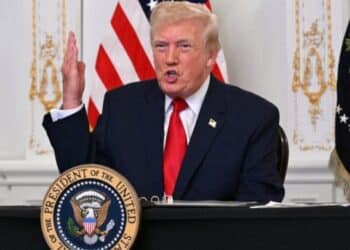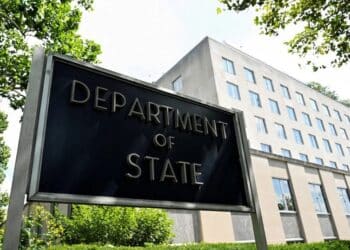On the first day of his new term, President Donald Trump signed orders ranging from climate to immigration, along with sweeping pardons for many of those who stormed the capital on January 6, 2021.
Some of his orders were delivered on his promises during the 2024 campaign. Others, like his withdrawal from the World Health Organisation (WHO) and the Paris Climate Accord, were unexpected.
Trump signed an order for the United States to leave the WHO, insisting that Washington was unfairly paying more than China to participate in the UN body.
He also announced that Washington was withdrawing from the Paris Climate Accord for a second time, a defiant rejection of global efforts to combat planetary warming.
In his new executive order, Trump directed agencies to “pause the future transfer of any United States Government funds, support, or resources to the WHO” and to “identify credible and transparent United States and international partners to assume necessary activities previously undertaken by the WHO.”
This would significantly reduce the WHO’s budget. Trump’s move would deprive the UN health agency of a critical partner in tackling public health threats worldwide.
Withdrawal from the WHO comes into force one year after notification is formally deposited with the UN.
On Tuesday, the WHO said it regretted the withdrawal decision and hoped Washington would reconsider.
The United States “plays a crucial role in supporting WHO to protect and improve the health of Americans and people around the world,” the WHO says on its website.
The WHO highlighted Washington’s work in tackling polio, Ebola, and last year’s outbreaks of pox in the Democratic Republic of the Congo and Marburg, Rwanda.
“The USA-WHO collaboration also plays a pivotal role in combating global HIV,” it said.
The United States would join Liechtenstein as the only UN member state, not in the WHO.
WHO and its Operations
The WHO receives money from its 194 member states, non-governmental organisations and other donors.
Founded in 1948, the agency initially received all its funding through “assessed contributions”: nations’ membership fees calculated according to wealth and population.
However, the WHO became increasingly reliant on “voluntary contributions”, which only contribute to outcomes specified by the donor.
In the last complete budget cycle, 2022-23, membership dues accounted for only 12 percent of the WHO’s funding.
The COVID-19 pandemic emphasized the need for more predictable and flexible funding to tackle emerging health shocks better.
Therefore, member states agreed to abandon pre-earmarked contributions and increase membership fees to cover 50 percent of the organisation’s budget by 2030.
The WHO announced last November that it had raised nearly $4 billion through a new financing mechanism after attracting dozens of new donors.
The WHO’s budget for the completed 2022 and 2023 cycle stood at $7.89 billion.
In that cycle, the United States was the WHO’s biggest donor, contributing $1.3 billion, or 16.3 per cent of the total.
The next biggest contributors were Germany ($856 million), the Bill and Melinda Gates Foundation ($830 million), the Gavi vaccine alliance ($481 million) and the European Commission ($468 million).
China, in 11th place, contributed $157 million.
On Monday, Trump said the WHO had “ripped us off”, noting how Washington was paying far more than Beijing.
China, UN, EU, experts react
The European Union has raised alarms over Trump’s announcement regarding plans to exit the WHO, warning it could undermine the response to future pandemics.
The European Commission called the decision concerning and expressed hope that the U.S. might rethink its stance before completing any formal withdrawal. EU officials emphasise the importance of the WHO amid the ongoing global health challenges.
With a global pandemic in the background, the EU underscores the critical role of international cooperation and dialogue, hoping the U.S., a major player in global health, will remain part of the organization.
“If we want to be resilient to global health threats, we need to have global cooperation,” commission spokeswoman Eva Hrncirova told reporters. “We trust that the US administration will consider all this ahead of the formal withdrawal.”
The UN Humanitarian Affairs Office (OCHA) spokesperson, Jens Laerke, highlighted the UN health agency’s importance, saying: “The world lives longer, healthier, perhaps a little bit happier because of WHO”.
“WHO is in places where others cannot go,” Laerke said, including Gaza, Yemen, Afghanistan and Sudan.
“It is an indispensable part of the international humanitarian system,” he insisted.
From the UN World Meteorological Organisation (WMO), spokesperson Clare Nullis reacted to President Trump’s vow to quit the universally adopted 2015 Paris Agreement.
The need for all countries to respect the accord was “pretty obvious”, she said, given that 2024 “was the hottest year on record”, at about 1.55°C above the pre-industrial era.
“It is the defining challenge of our time,” she insisted.
In the wake of the recent devastating and deadly massive wildfires that ripped through Los Angeles, the WMO spokesperson also noted that the U.S. had suffered the bulk of global economic losses from weather, climate, and water-related hazards.
“It has sustained 403 weather and climate disasters since 1980 where overall damages/costs reached or exceeded 1 billion dollars.
“The total cost of these 403 events exceeds 2.915 trillion billion, according to U.S. figures,” Nullis said.
Her comments echoed those of the UN Spokesperson’s Office late on Monday, which responded to journalists’ questions insisting that “the transformation envisaged in the Paris Agreement is already underway,” with a renewable “energy revolution” offering opportunities for jobs and prosperity.
“The Secretary-General remains confident that cities, states, and businesses within the United States and other countries will continue to demonstrate vision and leadership by working for the low-carbon, resilient economic growth that will create quality jobs and markets for 21st-century prosperity.
“The United States must remain a leader on environmental issues,” the statement stated.
Several experts also expressed dismay at the withdrawal.
“We cannot make WHO more effective by walking away from it,” Tom Frieden, a former senior health official under Barack Obama, wrote on X.
“The decision to withdraw weakens America’s influence, increases the risk of a deadly pandemic, and makes all of us less safe.”










